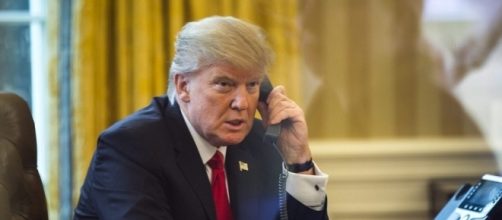No long after Donald Trump announced his campaign for president, he quickly discovered that Twitter was a new way to communicate with potential voters. Despite the positives, many of Trump's staff members used a unique strategy to limit his social media outbursts.
Trump on Twitter
It didn't take long before President Donald Trump realized that social media was a growing platform that would enable him to connect with the American people. As time went on and his feud with the mainstream media intensified, the former host of "The Apprentice" increased his presence on Twitter.
While the positive aspects included gaining new followers and helping to connect those who wanted a "Washington outsider" for president, his unconventional and controversial Twitter rants brought negative feedback to the campaign. Whether it was a shot at a celebrity, a political opponents, a news outlet, or an entire foreign country, Trump spent countless hours ranting and raving on social media. As reported by Politico on February 22, Trump's rage on Twitter would have been even worse if it wasn't for his careful staff members.
How Trump’s campaign staffers tried to keep him off Twitter https://t.co/1tp36urdHA via @tarapalmeri pic.twitter.com/882lIYwHTy
— POLITICO (@politico) February 22, 2017
While Donald Trump is a 70-year-old billionaire business man, his campaign staff handled him with kid gloves, according to the report by Politico.
In order to limit his controversial use of Twitter, Trump campaign staff members filtered what information he was receiving on a daily basis. Trump was often given news stories that painted a brighter picture with positive coverage, from conservative news outlets like The Washington Examiner, to more hard-line right-wing sites like Breitbart, to even conspiracy media outlets like Infowars.
Trump campaign team only showed him positive coverage to control Twitter habits: report https://t.co/R7NZi55ecS pic.twitter.com/KioFX5yelF
— The Hill (@thehill) February 22, 2017
Trump bubble
Politico also points out that Donald Trump is not a big fan of reading news strictly on the internet, and favors print over digital. In an ironic twist, Trump's "go-to" news outlet is the New York Times, the paper that he often bashes and refers to as "failing." In addition, the commander in chief has been described as a "near-nonstop consumer of cable news," which is evident in his constant Twitter attacks on CNN and other outlets that he accuses of pushing "fake news" about him.
One former campaign offical explained that the president is more inclined to tweet when he thinks an issue is not getting enough attention, noting, "He sends out these tweets when he feels like people aren't responding enough for him." As of press time, the White House has not responded to the Politico report.

